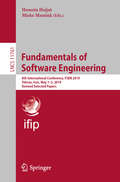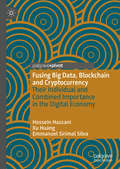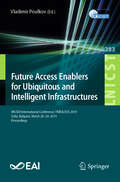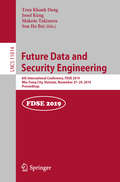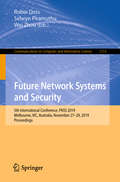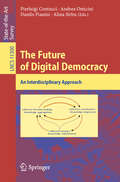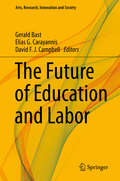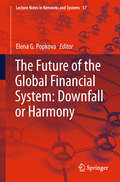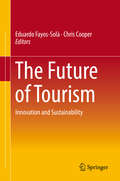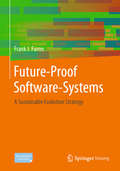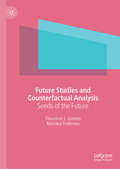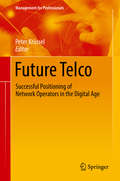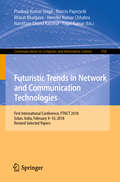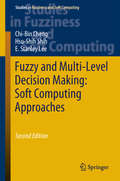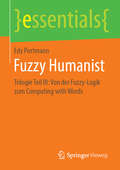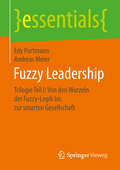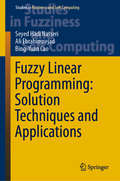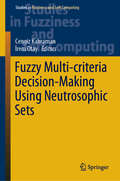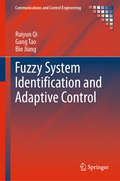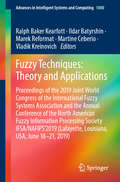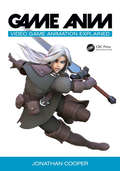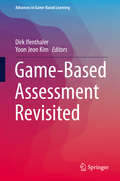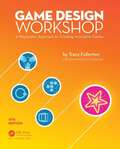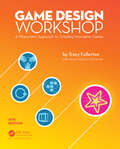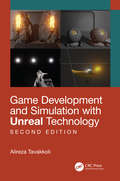- Table View
- List View
Fundamentals of Software Engineering: 8th International Conference, FSEN 2019, Tehran, Iran, May 1-3, 2019, Revised Selected Papers (Lecture Notes in Computer Science #11761)
by Mieke Massink Hossein HojjatThis book constitutes the thoroughly refereed post-conference proceedings of the 8th International Conference on Fundamentals of Software Engineering, FSEN 2019, held in Tehran, Iran, in May 2019.The 14 full papers and 3 short papers presented in this volume were carefully reviewed and selected from 47 submissions. The topics of interest in FSEN span over all aspects of formal methods, especially those related to advancing the application of formal methods in the software industry and promoting their integration with practical engineering techniques. The papers are organized in topical sections on agent based systems, theorem proving, learning, verification, distributed algorithms, and program analysis.
Fusing Big Data, Blockchain and Cryptocurrency: Their Individual and Combined Importance in the Digital Economy
by Hossein Hassani Xu Huang Emmanuel Sirimal SilvaAs technology continues to revolutionise today’s economy, Big Data, Blockchain and Cryptocurrency are rapidly transforming themselves into mainstream functions within the financial services industry. This book examines each concept individually, analysing the opportunities and challenges they bring and exploring the potential for future development. The authors further evaluate the fusion of these three important products of the FinTech revolution, illustrating their combined influence on the digital economy. Providing a comprehensive analysis of three innovative technologies, this timely book will appeal to scholars researching innovation in the finance industry and financial services technology more specifically.
Future Access Enablers for Ubiquitous and Intelligent Infrastructures: 4th EAI International Conference, FABULOUS 2019, Sofia, Bulgaria, March 28-29, 2019, Proceedings (Lecture Notes of the Institute for Computer Sciences, Social Informatics and Telecommunications Engineering #283)
by Vladimir PoulkovThis book constitutes the refereed post-conference proceedings of the Fourth International Conference on Future Access Enablers for Ubiquitous and Intelligent Infrastructures, FABULOUS 2019, held in Sofia, Bulgaria, in March 2019. This year’s conference topic covers Globalization through Advanced Digital Technologies – as the digitalization in all spheres of life has an impressive influence on communication and daily life in general. The 39 revised full papers were carefully reviewed and selected from 54 submissions. The main topics deal with: healthcare/wellness applications; IoT and sensor networks; IoT security in the digital transformation era; wireless communications and networks; virtual engineering and simulations.
Future Data and Security Engineering: 6th International Conference, FDSE 2019, Nha Trang City, Vietnam, November 27–29, 2019, Proceedings (Lecture Notes in Computer Science #11814)
by Tran Khanh Dang Josef Küng Makoto Takizawa Son Ha BuiThis book constitutes the proceedings of the 6th International Conference on Future Data and Security Engineering, FDSE 2019, held in Nha Trang City, Vietnam, in November 2019.The 38 full papers and 14 short papers presented together with 2 papers of keynote speeches were carefully reviewed and selected from 159 submissions. The selected papers are organized into the following topical headings: Invited Keynotes, Advanced Studies in Machine Learning, Advances in Query Processing and Optimization, Big Data Analytics and Distributed Systems, Deep Learning and Applications, Cloud Data Management and Infrastructure, Security and Privacy Engineering, Authentication and Access Control, Blockchain and Cybersecurity, Emerging Data Management Systems and Applications, Short papers: Security and Data Engineering.
Future Network Systems and Security: 5th International Conference, FNSS 2019, Melbourne, VIC, Australia, November 27–29, 2019, Proceedings (Communications in Computer and Information Science #1113)
by Robin Doss Selwyn Piramuthu Wei ZhouThis book constitutes the refereed proceedings of the 5th International Conference on Future Network Systems and Security, FNSS 2019, held in Melbourne, Australia, in November 2019. The 16 full papers and two short papers presented were carefully reviewed and selected from 38 submissions. The papers are organized in topical sections onemerging networks and applications; security, privacy and trust; and security analytics and forensics
The Future of Digital Democracy: An Interdisciplinary Approach (Lecture Notes in Computer Science #11300)
by Pierluigi Contucci Andrea Omicini Danilo Pianini Alina SîrbuDigital democracy is a hot topic nowadays, its relevance growing along with the impact of computational platforms on our(political) life. Communication is the basal fabric on which society is defined, and it appears obvious that the civic organisation and politics itself should take the opportunities the "digital revolution" offers. Institutional inertia, nevertheless, causes large delays in updating and adapting. Therefore, the balance between participation and delegated representation is now facing a crisis. A thorough understanding of the factors involved in participation is a first step towards providing solutions. Using the Internet to fill the gap and build a digital democracy provides an opportunity, along with several risks that need to be carefully analysed. It needs to be implemented using a fully inter- and trans-disciplinary perspective. The six contributions included in this State-of-the Art Survey present research in the field of social sciences as well as mathematics and computer science and aim at contributing to a better understanding of the potential and dangers of digital democracy, helping readers go beyond the misunderstandings, the misconceptions,and the conceptual and practical abuses that the very notion of democracy is undergoing during this age of technological revolution and social turmoils.
The Future of Education and Labor (Arts, Research, Innovation and Society)
by Elias G. Carayannis David F. J. Campbell Gerald BastThis book explores the ways in which education impacts labor markets. Specifically, the contributions in this book indicate that the future of labor is creative, socially aware and inter-disciplinary while identifying the changes and innovations needed in our educational systems to meet this demand.Due to an increasing automatization (robotic manufacturing), the character of labor and work in general will change dramatically in the near future. This will be the case not only in the western countries, but also in the larger emerging economies in Asia, for example China and India. While societal environments, economy and the character of labor are increasingly in a process of dramatic changes, the educational systems and the leading principles of research about labor and employment are not changing adequately. Cross-disciplinary (inter-disciplinary and trans-disciplinary) thinking and learning is not the main focus of our educational systems. Consequently, the systems of academic research follow and apply disciplinary or even sub-disciplinary strategies, avoiding cross-disciplinary research approaches, and not supporting inter-disciplinary academic career models. This book introduces such strategic models to better prepare the next generation of workers for the new knowledge economy, and the future of democratic societies.
The Future of the Global Financial System: Downfall or Harmony (Lecture Notes in Networks and Systems #57)
by Elena G. PopkovaThis book gathers the best papers presented at the conference “The Future of the Global Financial System: Downfall or Harmony”, which took place in Limassol, Cyprus on April 13-14, 2018. Organized by the Institute of Scientific Communications (Volgograd, Russia), the conference chiefly focused on reassessing the role and meaning of the global financial system in the modern global economy in light of the crisis that began in 2008 and can still be observed in many countries, and on developing conceptual and applied recommendations on spurring the development of the global financial system. All works underwent peer-review and conform to strict criteria, including a high level of originality (more than 90%), elements of scientific novelty, contribution to the development of economic science, and broad possibilities for practical application. The target audience of this scientific work includes postgraduates, lecturers at higher educational establishments, and researchers studying the modern global financial system. Based on the authors’ conclusions and results, readers will be equipped to pursue their own scientific research. The topics addressed include (but are not limited to) the following issues, which are interesting for modern economic science and practice: financial globalization, the role of finances in the global economy, perspectives of transition in the financial system from part of the infrastructure to a new vector of development in the global economy in the 21st century, reasons for the crisis of the modern financial system and ways of overcoming it, problems and perspectives regarding the harmonization of the global financial system, and scenarios of development for the global financial system. The content is divided into the following parts: development of financial systems at the micro-, meso- and macro-levels, financial infrastructure of the modern economy, legal issues of development of the modern financial system, and management of the global financial system.
The Future of Tourism: Innovation And Sustainability
by Chris Cooper Eduardo Fayos-SolàThis book presents the foundations for the future of tourism in a structured and detailed format. The who-is-who of tourism intelligence has collaborated to present a definitive blueprint for tourism reflecting the role of science, market institutions, and governance in its innovation and sustainability. The book adopts a comprehensive approach, exploring recent research and the latest developments in practice to inform the reader about instruments and actions that can shape a successful future for tourism. Broad in scope, the book incorporates the perspectives of leading tourism academics, as well as the views of tourism entrepreneurs, destination managers, government officials, and civil leaders. The book is divided into three parts, the first of which addresses the scientific facets of innovation, analyzing the challenges and opportunities that technology provides for organic and disruptive developments in tourism, which will shape its future. In turn, the second part examines socio-cultural paradigms – with a view to dismantling traditional barriers to innovation. It also explores the role of heritage and the ethics of inclusiveness as drivers for sustainable tourism. The third part investigates new ways and means in governance and policy making for tourism. It introduces advances such as strategic positioning, symbiotic partnerships, and innovative management, and closes by presenting governance frameworks for an inclusive and sustainable future of tourism.
Future-Proof Software-Systems: A Sustainable Evolution Strategy
by Frank J. FurrerThis book focuses on software architecture and the value of architecture in the development of long-lived, mission-critical, trustworthy software-systems. The author introduces and demonstrates the powerful strategy of “Managed Evolution,” along with the engineering best practice known as “Principle-based Architecting.” The book examines in detail architecture principles for e.g., Business Value, Changeability, Resilience, and Dependability. The author argues that the software development community has a strong responsibility to produce and operate useful, dependable, and trustworthy software. Software should at the same time provide business value and guarantee many quality-of-service properties, including security, safety, performance, and integrity. As Dr. Furrer states, “Producing dependable software is a balancing act between investing in the implementation of business functionality and investing in the quality-of-service properties of the software-systems.” The book presents extensive coverage of such concepts as: Principle-Based Architecting Managed Evolution StrategyThe Future Principles for Business Value Legacy Software Modernization/Migration Architecture Principles for Changeability Architecture Principles for Resilience Architecture Principles for Dependability The text is supplemented with numerous figures, tables, examples and illustrative quotations. Future-Proof Software-Systems provides a set of good engineering practices, devised for integration into most software development processes dedicated to the creation of software-systems that incorporate Managed Evolution.
Future Studies and Counterfactual Analysis: Seeds of the Future
by Theodore J. Gordon Mariana TodorovaIn this volume, the authors contribute to futures research by placing the counterfactual question in the future tense. They explore the possible outcomes of future, and consider how future decisions are turning points that may produce different global outcomes. This book focuses on a dozen or so intractable issues that span politics, religion, and technology, each addressed in individual chapters. Until now, most scenarios written by futurists have been built on cause and effect narratives or depended on numerical models derived from historical relationships. In contrast, many of the scenarios written for this book are point descriptions of future discontinuities, a form allows more thought-provoking presentations. Ultimately, this book demonstrates that counterfactual thinking and point scenarios of discontinuities are new, groundbreaking tools for futurists.
Future Telco: Successful Positioning of Network Operators in the Digital Age (Management for Professionals)
by Peter KrüsselThis book examines the extensive changes in markets, technologies and value chains that telecommunication companies are currently confronted with. It analyzes the crossroads they have reached and the choices that now need to be made – to be a bit pipe or a trendsetter of digitalization. Based on an analysis of the key challenges for telcos, the book derives future market scenarios and puts forward recommendations for how they can successfully position themselves. It proposes a framework based on seven “levers,” which addresses concrete measures in each step of the value chain, ranging from technology, IT and processes, to innovation, marketing and sales issues. The book discusses the current challenges and provides both general recommendations and concrete solutions. Respected experts illustrate innovative strategic and technical trends and provide insights gained in real-life transformation projects. Recent developments in the areas of regulation, product development, competition between over-the-top (OTT) providers and telcos, as well as technical innovations like 5G, SDN/NFV, LEO satellites and MEC are discussed. Accordingly, practitioners, managers and researchers alike will benefit from the book’s wealth of examples and up-to-date insights.
Futuristic Trends in Network and Communication Technologies: First International Conference, FTNCT 2018, Solan, India, February 9–10, 2018, Revised Selected Papers (Communications in Computer and Information Science #958)
by Pradeep Kumar Singh Marcin Paprzycki Bharat Bhargava Jitender Kumar Chhabra Narottam Chand Kaushal Yugal KumarThis book constitutes the refereed proceedings of the First International Conference on Futuristic Trends in Network and Communication Technologies, FTNCT 2018, held in Solan, India, in February 2018. The 37 revised full papers presented were carefully reviewed and selected from 239 submissions. The prime aim of the conference is to invite researchers from different domains of network and communication technologies to a single platform to showcase their research ideas. The selected papers are organized in topical sections on communication technologies, Internet of Things (IoT), network technologies, and wireless networks.
Fuzzy and Multi-Level Decision Making: Soft Computing Approaches (Studies in Fuzziness and Soft Computing #368)
by Chi-Bin Cheng Hsu-Shih Shih E. Stanley LeeThis book offers a comprehensive overview of cutting-edge approaches for decision-making in hierarchical organizations. It presents soft-computing-based techniques, including fuzzy sets, neural networks, genetic algorithms and particle swarm optimization, and shows how these approaches can be effectively used to deal with problems typical of this kind of organization. After introducing the main classical approaches applied to multiple-level programming, the book describes a set of soft-computing techniques, demonstrating their advantages in providing more efficient solutions to hierarchical decision-making problems compared to the classical methods. Based on the book Fuzzy and Multi-Level Decision Making (Springer, 2001) by Lee E.S and Shih, H., this second edition has been expanded to include the most recent findings and methods and a broader spectrum of soft computing approaches. All the algorithms are presented in detail, together with a wealth of practical examples and solutions to real-world problems, providing students, researchers and professionals with a timely, practice-oriented reference guide to the area of interactive fuzzy decision making, multi-level programming and hierarchical optimization.
Fuzzy Humanist: Trilogie Teil III: Von der Fuzzy-Logik zum Computing with Words (essentials)
by Edy PortmannAuch mit Worten, Phrasen, Präpositionen, Fragen sowie anderen semantischen Einheiten der natürlichen Sprache ist es möglich, zu rechnen. Daher ist diese Methode für einen Einsatz im Sinne des Humanismus prädestiniert. Edy Portmann erläutert den Zusammenhang von Fuzzy-Logik und dem Rechnen mit Worten und zeigt daran den Unterschied zwischen heutigen Suchmaschinen sowie zukünftigen Frage-Antwort-Systemen auf. Er legt dar, wie das Rechnen mit Worten als Grundlage einer Mensch-Maschine-Symbiose dient, die in kollektiver (urbaner) Intelligenz mündet. Als Ausblick weist der Autor darauf hin, wie Computing with Words zur Schaffung von kollektiver Intelligenz beitragen kann.Der Autor:Prof. Dr. Edy Portmann ist Swiss Post Professor of Computer Science am Human-IST Institut der Universität Fribourg, Schweiz. In seiner Forschung beschäftigt er sich mit Fragen rund um Informationssysteme, -verarbeitung und -beschaffung.
Fuzzy Leadership: Trilogie Teil I: Von den Wurzeln der Fuzzy-Logik bis zur smarten Gesellschaft (essentials)
by Edy Portmann Andreas MeierDie unscharfe Logik (Fuzzy Logic) erweitert die klassische Logik, indem neben den beiden Wahrheitswerten 1 für ‚wahr’ und 0 für ‚falsch’ alle Werte des Einheitsintervalls zugelassen sind. Die unscharfe Logik entspricht der menschlichen Wahrnehmung, da sie unsichere Sachverhalte oder vage Aussagen in einem Entscheidungsprozess mitberücksichtigt. Edy Portmann und Andreas Meier geben in diesem essential über Fuzzy Leadership einen Überblick zu Grundlagen der unscharfen Logik und zeigen das Potenzial in unterschiedlichen Anwendungen der digitalen Wirtschaft sowie in der Informations- und Wissensgesellschaft auf. Die Autoren:Prof. Dr. Edy Portmann ist Swiss Post Professor of Computer Science am Human-IST Institut der Universität Fribourg, Schweiz. In seiner Forschung beschäftigt er sich mit Fragen rund um Informationssysteme, -verarbeitung und -beschaffung. Prof. Dr. Andreas Meier leitete in den Jahren 1999 bis 2018 den Lehrstuhl für Wirtschaftsinformatik an der Universität Fribourg, Schweiz. Seine Forschungsgebiete waren eBusiness, eGovernment und Informationsmanagement.
Fuzzy Linear Programming: Solution Techniques and Applications (Studies in Fuzziness and Soft Computing #379)
by Seyed Hadi Nasseri Ali Ebrahimnejad Bing-Yuan CaoThis book presents the necessary and essential backgrounds of fuzzy set theory and linear programming, particularly a broad range of common Fuzzy Linear Programming (FLP) models and related, convenient solution techniques. These models and methods belong to three common classes of fuzzy linear programming, namely: (i) FLP problems in which all coefficients are fuzzy numbers, (ii) FLP problems in which the right-hand-side vectors and the decision variables are fuzzy numbers, and (iii) FLP problems in which the cost coefficients, the right-hand-side vectors and the decision variables are fuzzy numbers. The book essentially generalizes the well-known solution algorithms used in linear programming to the fuzzy environment. Accordingly, it can be used not only as a textbook, teaching material or reference book for undergraduate and graduate students in courses on applied mathematics, computer science, management science, industrial engineering, artificial intelligence, fuzzy information processes, and operations research, but can also serve as a reference book for researchers in these fields, especially those engaged in optimization and soft computing. For textbook purposes, it also includes simple and illustrative examples to help readers who are new to the field.
Fuzzy Multi-criteria Decision-Making Using Neutrosophic Sets
by Cengiz Kahraman İrem OtayThis book offers a comprehensive guide to the use of neutrosophic sets in multiple criteria decision making problems. It shows how neutrosophic sets, which have been developed as an extension of fuzzy and paraconsistent logic, can help in dealing with certain types of uncertainty that classical methods could not cope with. The chapters, written by well-known researchers, report on cutting-edge methodologies they have been developing and testing on a variety of engineering problems. The book is unique in its kind as it reports for the first time and in a comprehensive manner on the joint use of neutrosophic sets together with existing decision making methods to solve multi-criteria decision-making problems, as well as other engineering problems that are complex, hard to model and/or include incomplete and vague data. By providing new ideas, suggestions and directions for the solution of complex problems in engineering and decision making, it represents an excellent guide for researchers, lecturers and postgraduate students pursuing research on neutrosophic decision making, and more in general in the area of industrial and management engineering.
Fuzzy System Identification and Adaptive Control (Communications and Control Engineering)
by Ruiyun Qi Gang Tao Bin JiangThis book provides readers with a systematic and unified framework for identification and adaptive control of Takagi–Sugeno (T–S) fuzzy systems. Its design techniques help readers applying these powerful tools to solve challenging nonlinear control problems. The book embodies a systematic study of fuzzy system identification and control problems, using T–S fuzzy system tools for both function approximation and feedback control of nonlinear systems. Alongside this framework, the book also: introduces basic concepts of fuzzy sets, logic and inference system; discusses important properties of T–S fuzzy systems; develops offline and online identification algorithms for T–S fuzzy systems; investigates the various controller structures and corresponding design conditions for adaptive control of continuous-time T–S fuzzy systems; develops adaptive control algorithms for discrete-time input–output form T–S fuzzy systems with much relaxed design conditions, and discrete-time state-space T–S fuzzy systems; and designs stable parameter-adaptation algorithms for both linearly and nonlinearly parameterized T–S fuzzy systems. The authors address adaptive fault compensation problems for T–S fuzzy systems subject to actuator faults. They cover a broad spectrum of related technical topics and to develop a substantial set of adaptive nonlinear system control tools. Fuzzy System Identification and Adaptive Control helps engineers in the mechanical, electrical and aerospace fields, to solve complex control design problems. The book can be used as a reference for researchers and academics in nonlinear, intelligent, adaptive and fault-tolerant control.
Fuzzy Techniques: Proceedings of the 2019 Joint World Congress of the International Fuzzy Systems Association and the Annual Conference of the North American Fuzzy Information Processing Society IFSA/NAFIPS'2019 (Lafayette, Louisiana, USA, June 18–21, 2019) (Advances in Intelligent Systems and Computing #1000)
by Ralph Baker Kearfott Ildar Batyrshin Marek Reformat Martine Ceberio Vladik KreinovichThis book describes the latest findings related to fuzzy techniques, discussing applications in control, economics, education, humor studies, industrial engineering, linguistics, management, marketing, medicine and public health, military engineering, robotics, ship design, sports, transportation, and many other areas. It also presents recent fuzzy-related algorithms and theoretical results that can be used in other application areas. Featuring selected papers from the Joint World Congress of the International Fuzzy Systems Association (IFSA) and the Annual Conference of the North American Fuzzy Information Processing Society (NAFIPS) IFSA-NAFIPS’2019, held in Lafayette, Louisiana, USA, on June 18–21, 2019, the book is of interest to practitioners wanting to use fuzzy techniques to process imprecise expert knowledge. It is also a valuable resource for researchers wishing to extend the ideas from these papers to new application areas, for graduate students and for anyone else interested in problems involving fuzziness and uncertainty.
Game Anim: A Complete Guide to Video Game Animation
by Jonathan CooperWhat makes the difference between great video game animation and the purely functional, and how does this relatively new medium of non-linear animation creation differ from the more traditional fields of film and television? This book de-mystifies the animation side of game development, explaining every step of the process while providing valuable insights and work philosophies for creating the best game animation for beginners and professionals alike. Taking readers through a complete game production, this book provides a clear understanding of expectations of the game animator at every stage, featuring game animation fundamentals and how they fit within an overall project to offer a holistic approach to the field of game animation. Key Features Accumulated knowledge based on nearly two decades of insightful experience in all areas of video game animation. Establishes the fundamentals of creating great video game animation, and how to achieve them. A step-by-step explanation of every stage of a game production from the animator’s perspective. Readers should come away with an understanding of the expectations of a video game animator.
Game-Based Assessment Revisited (Advances in Game-Based Learning)
by Dirk Ifenthaler Yoon Jeon KimThe capabilities and possibilities of emerging game-based learning technologies bring about a new perspective of learning and instruction. This, in turn, necessitates alternative ways to assess the kinds of learning that are taking place in the game-based environments. The field has been broadening the focus of assessment in game environments (i.e., what we measure), developing processes and methodologies that go beyond psychometrics practices (i.e., how we go about assessment in games), and implementing the game-based assessment (GBA) in real contexts. The current state of the field calls for a revisit of this topic to understand what we have learned from the research on this topic, and how the GBA work changed how the field thinks about assessment beyond game environments. Accordingly, this comprehensive volume covers the current state of research, methodology, and technology of game-based assessment. It features four major themes: what we are measuring in games, how GBA has influenced how people do assessment beyond games, new methods and practices, and implementations of GBA. The audience for this volume includes researchers, graduate students, teachers, and professional practitioners in the areas of education, instructional design, educational psychology, academic and organizational development, and instructional technology.
Game Design Workshop: A Playcentric Approach to Creating Innovative Games
by Tracy FullertonDiscover an exercise-driven, non-technical approach to game design, without the need for programming or artistic expertise with Game Design Workshop, Fourth Edition. <p><p> Tracy Fullerton demystifies the creative process with clear and accessible analysis of the formal and dramatic systems of game design. Using examples of popular games, illustrations of design techniques, and refined exercises to strengthen your understanding of how game systems function and give you the skills and tools necessary to create a compelling and engaging game. <p> Game Design Workshop puts you to work prototyping, playtesting, and revising your own games with time-tested methods and tools. These skills will provide the foundation for your career in any facet of the game industry including design, producing, programming, and visual design.
Game Design Workshop: A Playcentric Approach to Creating Innovative Games, Fourth Edition (805r/gama Network Ser.)
by Tracy FullertonTracy Fullerton demystifies the creative process with clear and accessible analysis of the formal and dramatic systems of game design. Using examples of popular games, illustrations of design techniques, and refined exercises to strengthen your understanding of how game systems function and give you the skills and tools necessary to create a compelling and engaging game.<P><P> Game Design Workshop puts you to work prototyping, playtesting, and revising your own games with time-tested methods and tools. These skills will provide the foundation for your career in any facet of the game industry including design, producing, programming, and visual design.<P><P> Tracy Fullerton is an award-winning game designer and educator with over 20 years of professional experience, most recently winning the Games for Change Game of the Year Award for her independent game Walden, a game. She has also been awarded the 2016 GDC Ambassador Award, the 2015 Games for Change Game Changer Award, and the IndieCade 2013 Trailblazer award for her pioneering work in the independent games community. Tracy is a Professor of Interactive Media & Games at the USC School of Cinematic Arts and the Director of the USC Games Program, the #1 game design program in North America as ranked by the Princeton Review. <P><P> Key Features <li> Provides step-by-step introduction to the art of game designing, prototyping and playtesting innovative games <li> A design methodology used in the USC Interactive Media program, a cutting edge program with hands-on exercises that demonstrate key concepts and the design methodology <li> Insights from top industry game designers presented through interview format
Game Development and Simulation with Unreal Technology, Second Edition
by Alireza TavakkoliDr. Alireza Tavakkoli’s Game Development and Simulation with Unreal Technology covers the latest version of Unreal Technology. Since the 1990s Epic Games, Inc. has been leading the revolution of gaming graphics and Artificial Intelligence. Now, unreal technology is one of the most potent and prominent engines that is currently used in games. Its influence can be spotted in classic triple A titles like, Fortnite, Gears of War 2, Borderlands 2, and XCOM: Enemy Unknown. <P><P>Tavakkoli goes into detail concerning the creation of game level designs, blueprint coding, shader programing, as well as artificial intelligence concepts to help readers in creating their own games. Game Development also includes a number of practice friendly extensions and concept modules to help solidify the reader’s understanding of concepts and techniques. The book is divided into three sections that act as building blocks in order to facilitate the comprehension of the material. <P><P>Key Features: <P><P>Provides beginner level through advanced concepts in blueprint programming with the Unreal Engine 4.18 <P><P>Hundreds of small/mid-scale projects developed as concept examples throughout the book which can be utilized in more comprehensive entertaining interactive computer simulations and games <P><P>Chapter exercises will take the readers’ understanding of Unreal Engine to the next level.
